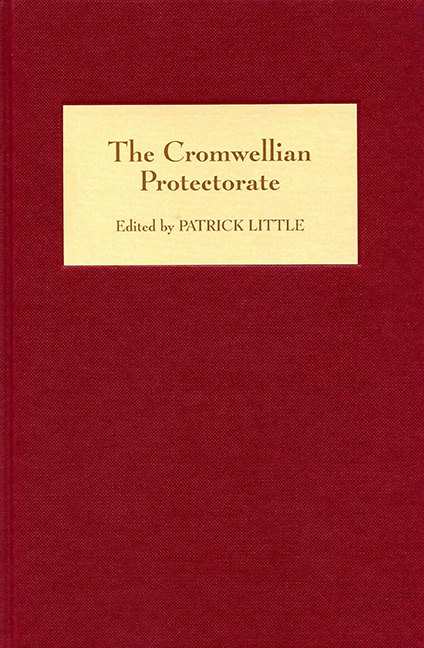Book contents
- Frontmatter
- Contents
- List of Illustrations
- Preface
- Notes on Contributors
- Abbreviations
- 1 Introduction
- 2 Oliver Cromwell and the Protectorate Parliaments
- 3 The Protector Humbled: Richard Cromwell and the Constitution
- 4 Cromwellian Style: The Architectural Trappings of the Protectorate Regime
- 5 Oliver Cromwell and the Council
- 6 ‘To Create a Little World out of Chaos’: The Protectoral Ordinances of 1653–1654 Reconsidered
- 7 The Irish and Scottish Councils and the Dislocation of the Protectoral Union
- 8 ‘This Murmuring and Unthankful Peevish Land’: Wales and the Protectorate
- 9 Cromwellian Towns in the Severn Basin: A Contribution to Cis-Atlantic History?
- 10 Policing the Cromwellian Church: The Activities of the County Ejection Committees, 1654–1659
- Index
5 - Oliver Cromwell and the Council
Published online by Cambridge University Press: 24 October 2017
- Frontmatter
- Contents
- List of Illustrations
- Preface
- Notes on Contributors
- Abbreviations
- 1 Introduction
- 2 Oliver Cromwell and the Protectorate Parliaments
- 3 The Protector Humbled: Richard Cromwell and the Constitution
- 4 Cromwellian Style: The Architectural Trappings of the Protectorate Regime
- 5 Oliver Cromwell and the Council
- 6 ‘To Create a Little World out of Chaos’: The Protectoral Ordinances of 1653–1654 Reconsidered
- 7 The Irish and Scottish Councils and the Dislocation of the Protectoral Union
- 8 ‘This Murmuring and Unthankful Peevish Land’: Wales and the Protectorate
- 9 Cromwellian Towns in the Severn Basin: A Contribution to Cis-Atlantic History?
- 10 Policing the Cromwellian Church: The Activities of the County Ejection Committees, 1654–1659
- Index
Summary
The counselling of rulers is the perennial problem of monarchical or neomonarchical government. The fate of realms depends on the qualities and influence of the advisers who have access to rulers and sway their judgements. Under the Tudors, men looked to ethics and education to mould providers of good counsel. Counsellors, it was urged, should be trained in virtue and wisdom and public spirit and be taught to shun their opposites. Amid the parliamentary conflicts and political emergencies of the early seventeenth century, that ethical approach became subordinate to an institutional one, which had medieval antecedents. Less was now said about the education of counsellors, more about the functioning of the royal, or privy, council. There were mounting pressures to make the king's advisers accountable for their misdeeds. The council, it was thought, should have formal powers to restrain the monarch, and should itself be answerable to parliament, the ‘great council’ of the realm, which should have a say in the council's membership.
Before the civil war that reasoning achieved nothing. Kings chose their privy councillors, and listened to them when and because they wanted to. There was no conciliary machinery to prevent them either from exercising their own wills or from handing power to favourites outside the council-chamber. The Long Parliament resolved to tackle that deficiency of the constitution. In the proposals for settlement that it pressed on Charles I before and during the war, it made two demands. The members of the privy council must be named, or at least approved, by parliament; and the privy council must be made responsible to, perhaps even in some sense representative of, parliament. Those requirements were adapted and developed in the constitutional proposals of the army in 1647–9 and the Rump Parliament in 1653.
The Instrument of Government, the contract by which Cromwell came to power, implemented the cumulative programme of the years 1641–53. At least to appearances, it replaced the rule of royal will by conciliar government. The protector was to administer the government with the council's ‘assistance’, and to rule ‘in all things by the advice of the council’. Only with its ‘consent’ could he ‘dispose and order’ the armed forces, make peace or war, or call parliaments supplementary to the triennial ones stipulated by the Instrument.
- Type
- Chapter
- Information
- The Cromwellian Protectorate , pp. 82 - 104Publisher: Boydell & BrewerPrint publication year: 2007



